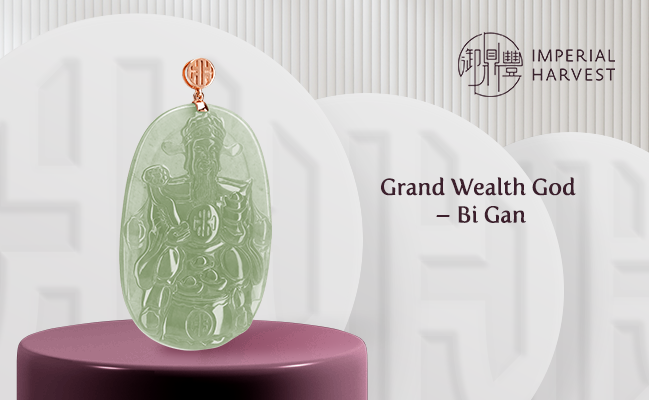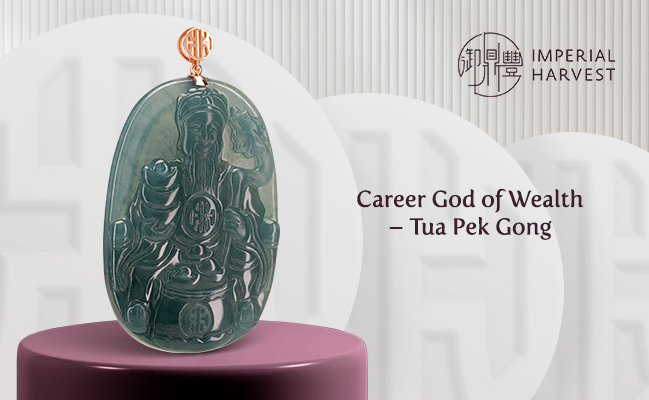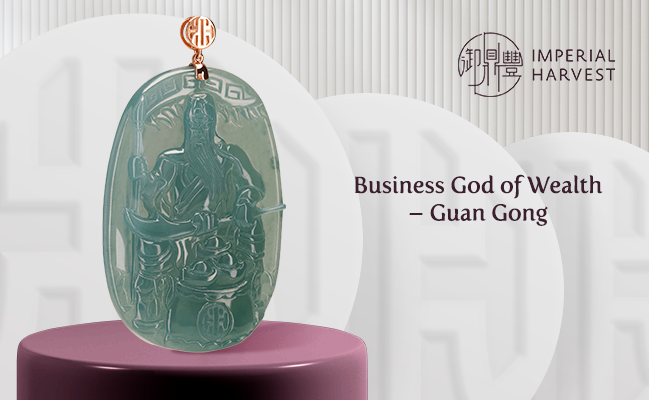

Posted by Imperial Harvest on 14 January 2022
Significance of Li Chun
Estimated Reading Time: 5 mins
According to the Chinese zodiac calendar, the year of the Tiger will soon be upon us. The arrival of a new year brings with it immense social and cultural significance, along with a raft of implications for Imperial Feng Shui. A new year bears the connotation of new beginnings and represents starting afresh on a clean slate. This gives rise to widespread celebrations of hope, as many look forward to renewal in their lives, accompanied by improved prosperity and other forms of blessing.
Arguably one of the most cherished and significant aspects of Chinese New Year festivities would be the onset of Li Chun (立春). This refers to the beginning of the first of 24 terms which constitute the Chinese solar calendar. In 2022, Li Chun falls on 4 February. It marks the period when the sun falls between the celestial longitudes of 315° and 330°, or more precisely when it aligns perfectly with the celestial longitude of 315°. Analogous to the implications of Li Dong, which signifies the onset of winter, Li Chun indicates the arrival of spring. Across most of the northern hemisphere, this period coincides with celebrations of Chinese New Year.
Cultural Traditions of Li Chun
Across large swathes of East Asia, the season of spring, and especially the Li Chun period, bears witness to the region’s largely agrarian roots. As Li Chun ushers in a new year, farmers traditionally used this time to appeal to an extensive pantheon of gods for favourable weather conditions and a bountiful year of harvest ahead. Worship of these gods was colourful and varied, with an intriguing diversity of elements, forms and expressions. Li Chun was also in practice a time of merriment and conviviality, with entire communities gathering in collective worship, song and dance.
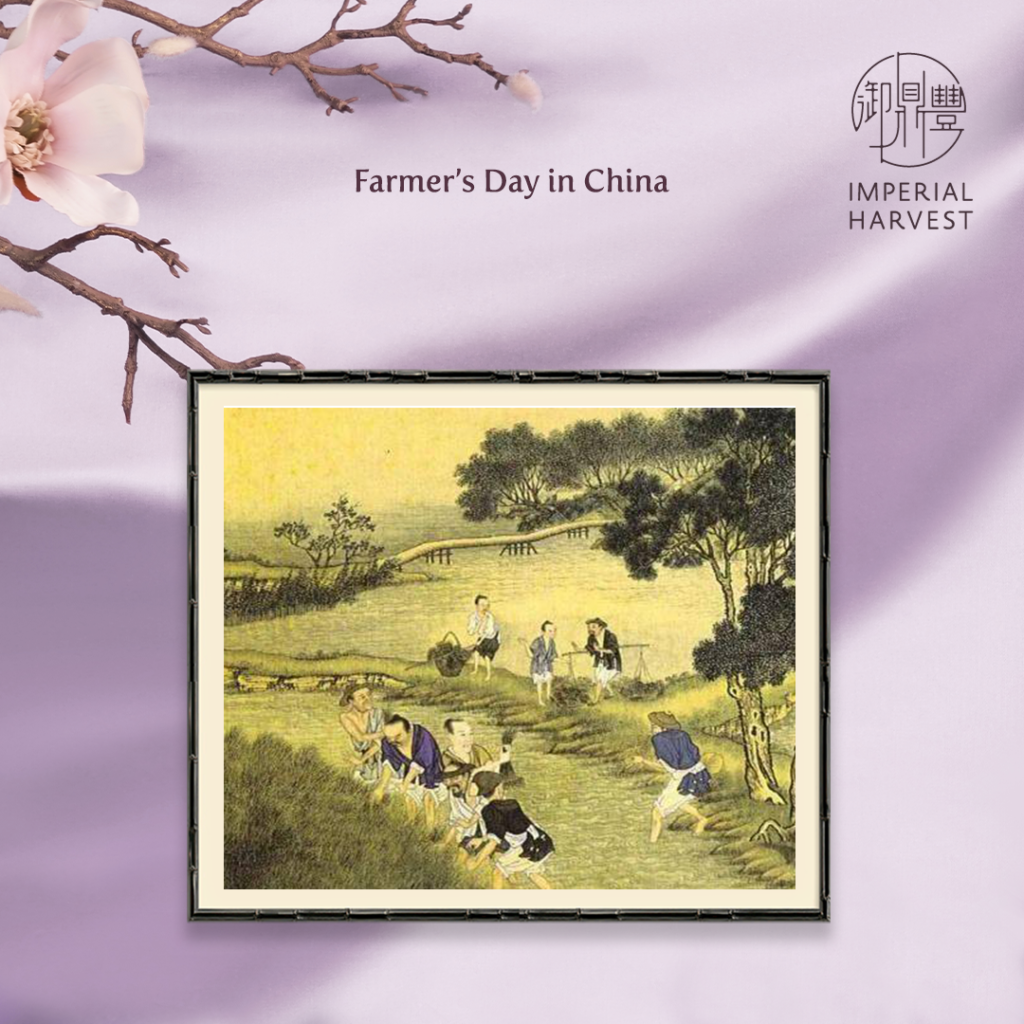
The importance of crop cultivation to these societies was underscored by the official proclamation of a “Farmers’ Day” around the Li Chun period. As the title suggests, this occasion served to highlight and celebrate the crucial role played by farmers in ensuring society’s continued sustenance and survival. It consisted of a series of community-based activities such as competitions, games and feasting, making it one of the most cherished and eagerly-anticipated celebratory events in the annual calendar. Farmers’ Day was celebrated just before the start of the hectic sowing season each spring, providing a welcome fillip to the land and crop preparation activities that would soon be in full swing.
Li Chun in the Imperial Court
Behind the gates of the imperial palace, the emperor and his court officials also geared up for Li Chun in no trivial manner. This period was when the emperor’s revered status as the Son of Heaven came to the fore. Acting as a Heaven-appointed custodian and commander of the earthly realm, he was in charge of the fortunes of his vast empire. With Li Chun marking the start of a new year, the emperor performed a timely intervention during this period for a fruitful year of harvest ahead, appealing on behalf of his earthly subjects for favourable weather conditions and crop yield.
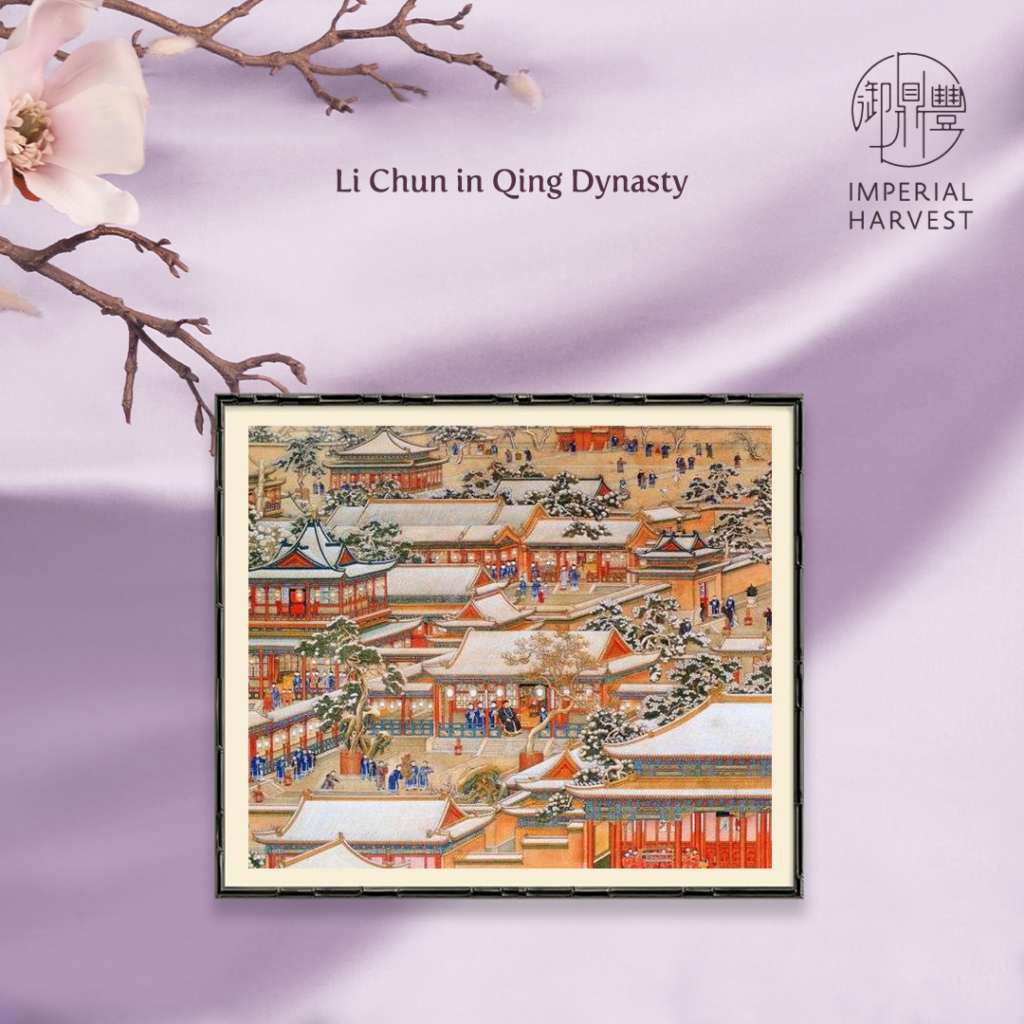
The emperor’s Li Chun rites were truly a spectacle to behold. Clad in his imperial finery, the Son of Heaven prepared sacrifices of the highest-graded livestock and produce, ascribing them to the skies while invoking the blessings of the omnipotent celestial beings. Ritualistic prayers, songs and chants were also performed, paying homage to the all-encompassing powers of Heaven.
Reflecting their utmost importance to the survival of the empire, the emperor’s imperial Li Chun rites demanded the flawless execution of all culturally-relevant proceedings. The slightest error was interpreted as an ominous foreshadowing of affliction and adversity, including poor crop quality. With this consideration, most commoners were barred from attending or witnessing the performance of the imperial Li Chun rites and were instead instructed to keep their distance. Over time, this kept the emperor’s Li Chun proceedings shrouded in secrecy, fuelling the common man’s fascination with the imperial mystique of this festival.
Season of Spring
According to the tenets of Imperial Feng Shui, the season of spring is closely associated with the minor yang. This is one of the four phenomena that form Tai Ji, the collective essence of Heaven and Earth. The minor yang’s significance in Imperial Feng Shui lies in its governance of individuals’ innate intuition. Intuition refers to the ability to discern and identify key information in the absence of clearly-defined data. It is critical for making decisions in uncertain situations, in which processes and actions to take may not be immediately obvious. Having good intuition empowers one to act decisively in the midst of ambiguity, and seize the day to enjoy first-mover advantages.
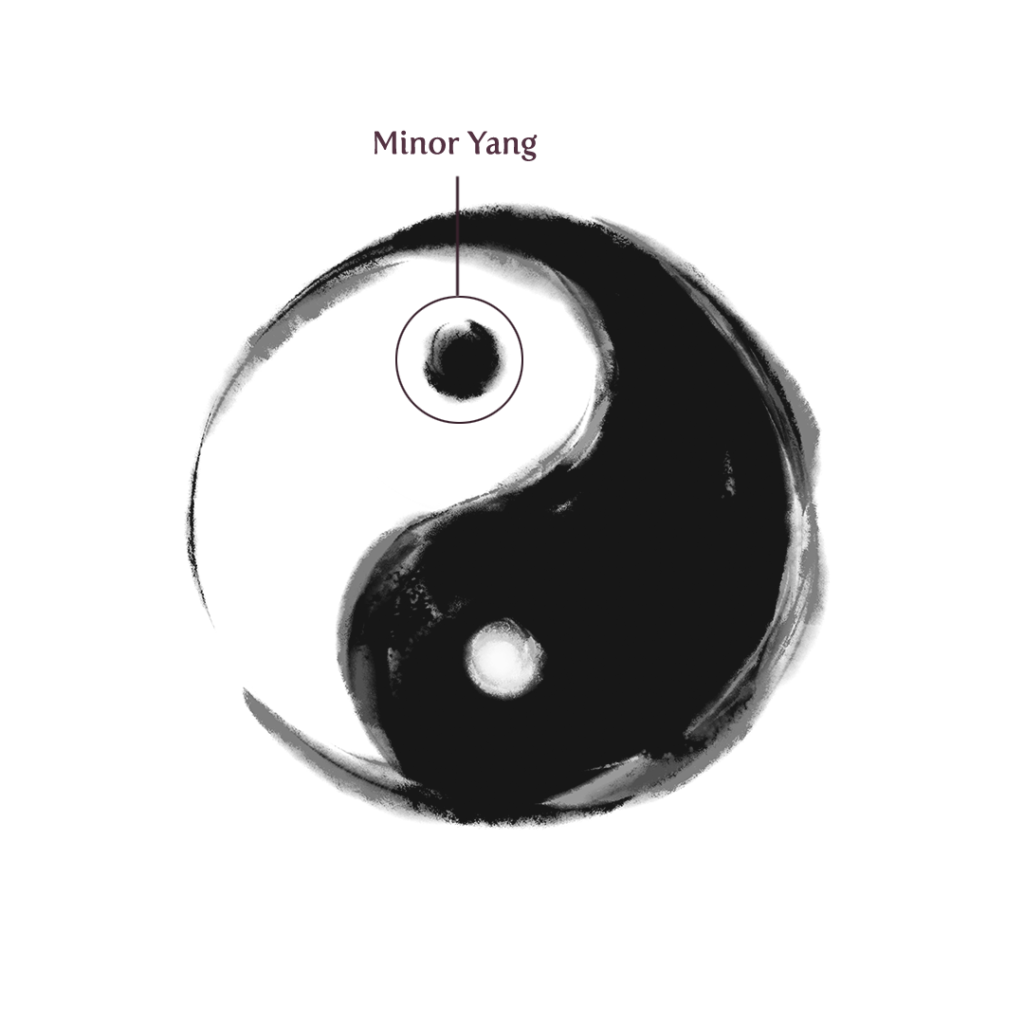 With the inherent link between intuition and the minor yang, increasing one’s intuitive qualities necessarily entails ensuring an optimal balance of this important phenomenon. In one of the seminal discoveries of Chinese dynastic history, Imperial Feng Shui masters of the Qing court found that fine jadeite cabochons possessed the ability to balance the minor yang. As a result of their rigorous studies of Imperial Feng Shui classics, the use of these earthly treasures to balance the minor yang became widespread.
With the inherent link between intuition and the minor yang, increasing one’s intuitive qualities necessarily entails ensuring an optimal balance of this important phenomenon. In one of the seminal discoveries of Chinese dynastic history, Imperial Feng Shui masters of the Qing court found that fine jadeite cabochons possessed the ability to balance the minor yang. As a result of their rigorous studies of Imperial Feng Shui classics, the use of these earthly treasures to balance the minor yang became widespread.
Imperial Harvest Fine Jadeite Cabochons
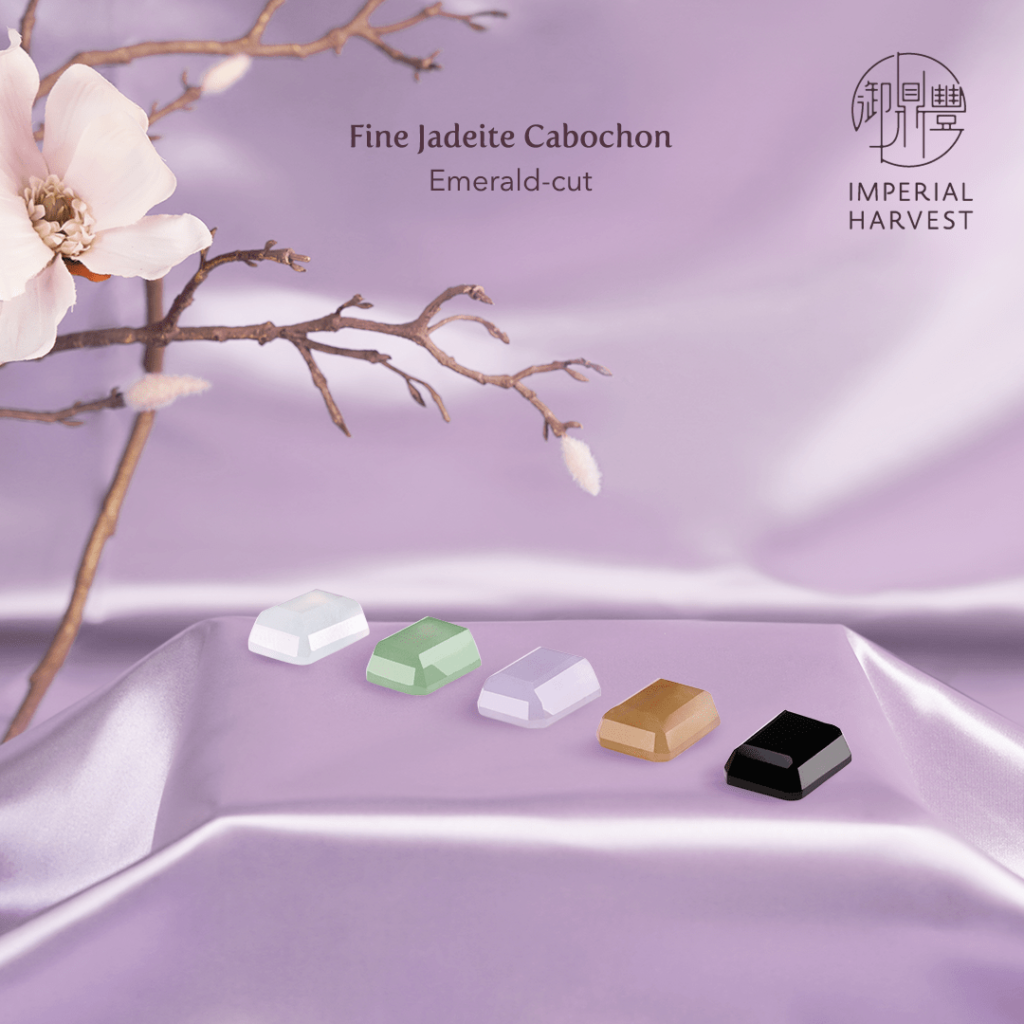
Today, Imperial Harvest continues to uphold the scholarly findings of these eminent masters. Fine jadeite cabochons are a mainstay of the Imperial Harvest collection, bestowing upon the destined owner elevated intuitive qualities applied to a range of personal and professional pursuits.
As Imperial Harvest welcomes Spring 2022, fine jadeite cabochon treasures inevitably take centre stage throughout this opportune season to amplify the minor yang. The Bliss of Harvest: Temple of Earth Edition ring is an auspicious Imperial Feng Shui treasure that aptly and unfailingly takes on this mantle.
Bliss of Harvest: Temple of Earth Edition
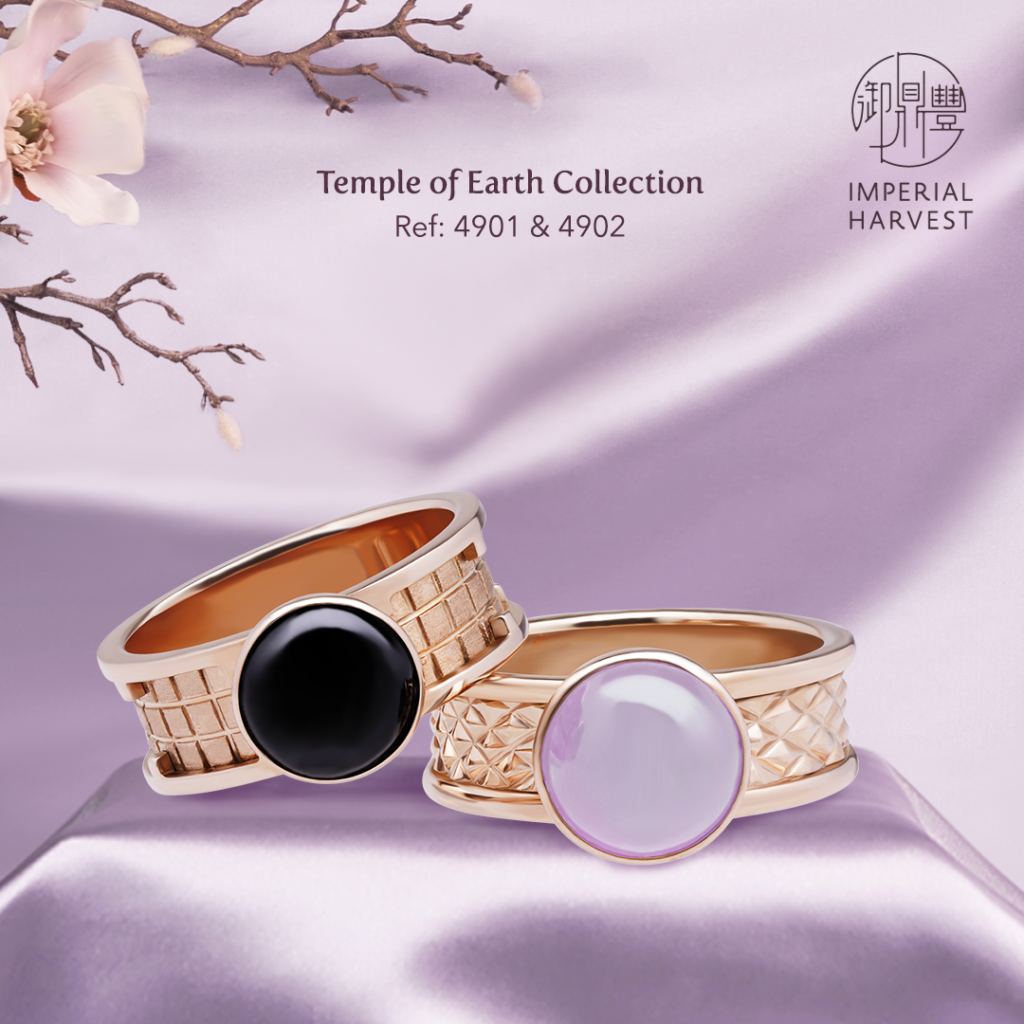
Inspired by the architecture of the Temple of Earth in central Beijing, the Bliss of Harvest: Temple of Earth Edition ring pays homage to this monumental site of imperial worship. Commissioned by Emperor Jia Jing of the Ming dynasty, it was completed in 1531 after intensive construction work. Since then, it has been an important site for successive generations of emperors, who performed a variety of prayers and other rituals within its hallowed compound. In particular, it was where sacrificial offerings were made to the God of Earth, also known as Tudi Gong or Tua Pek Gong, to whom emperors prayed for a flourishing and prosperous state of affairs across their land. Today, the Temple of Earth is a major tourist attraction and remains an important spiritual and cultural site of Chinese national significance.
Boasting a pristine fine jadeite cabochon as its crown jewel, the Imperial Harvest Bliss of Harvest: Temple of Earth Edition ring is a potent balancer of the minor yang, with an exquisite appearance to match. It portrays a visual symphony of innovative textures fused tastefully with the iconic cabochon, capturing the Imperial Harvest’s dedication to both contemporary design and cultural heritage.
The Bliss of Harvest: Temple of Earth Edition ring features two exquisite designs, inspired by the distinctive architectural language of its namesake. Each is a unique fusion of several finishes – matte, satin and mirror – showcasing Imperial Harvest’s mastery of gemstone design and production.
Temple of Earth: BOH4901
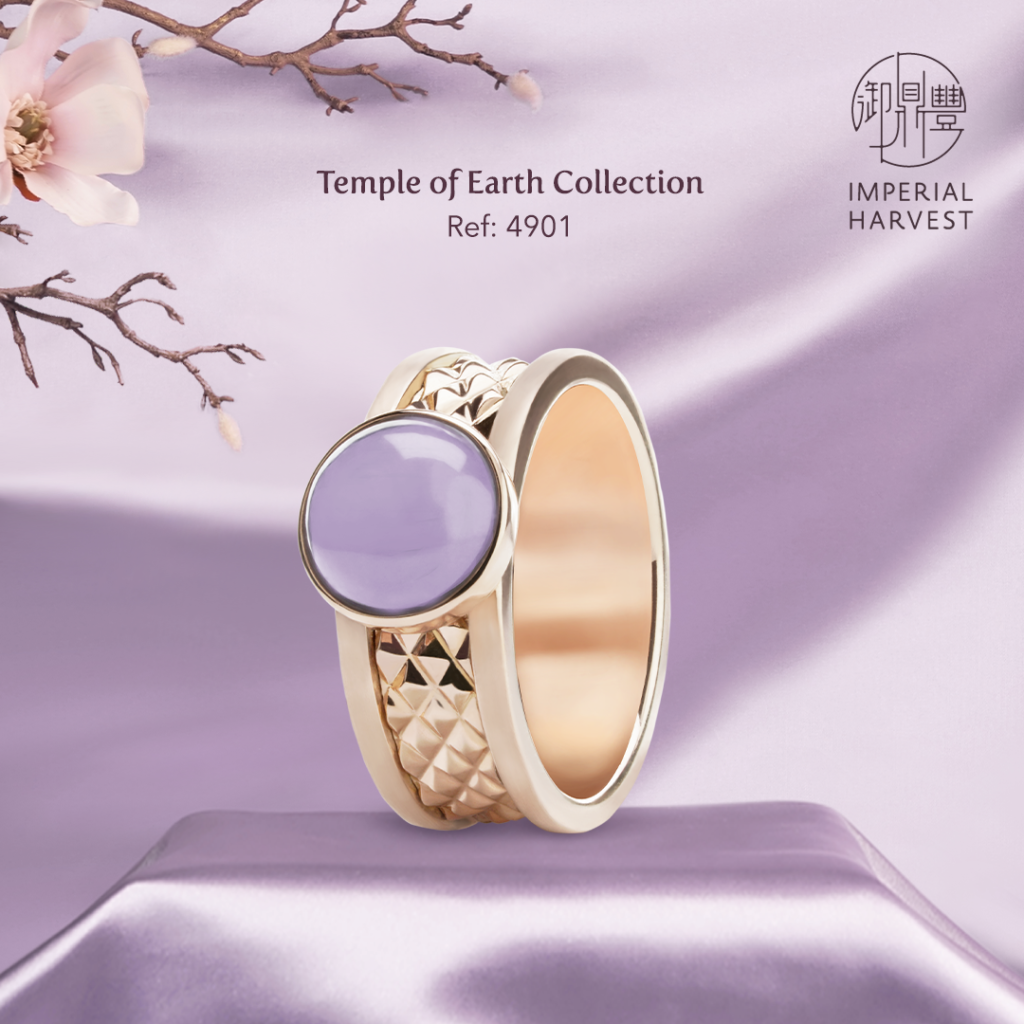
The Diamond-tiled Bliss of Harvest ring features an exquisitely guilloched hobnail pattern known as the Clous de Paris. On this ring, this detailed embossing is repurposed as a tribute to the characteristic design of the Temple of Earth. Indeed, the small pyramidal knobs and regular four-sided pattern evoke close comparisons with the Temple’s diamond-shaped roof.
On the bas-relief ring band, a series of diamond-inspired details project from the surface, highlighting both its grandeur and that of the Temple of Earth. The meticulously-textured and hand-polished band contrasts subtly with the surrounding matte rim, presenting a yin-yang depiction of the intertwined relationship between the heavenly and earthly realms.
Temple of Earth: BOH4902
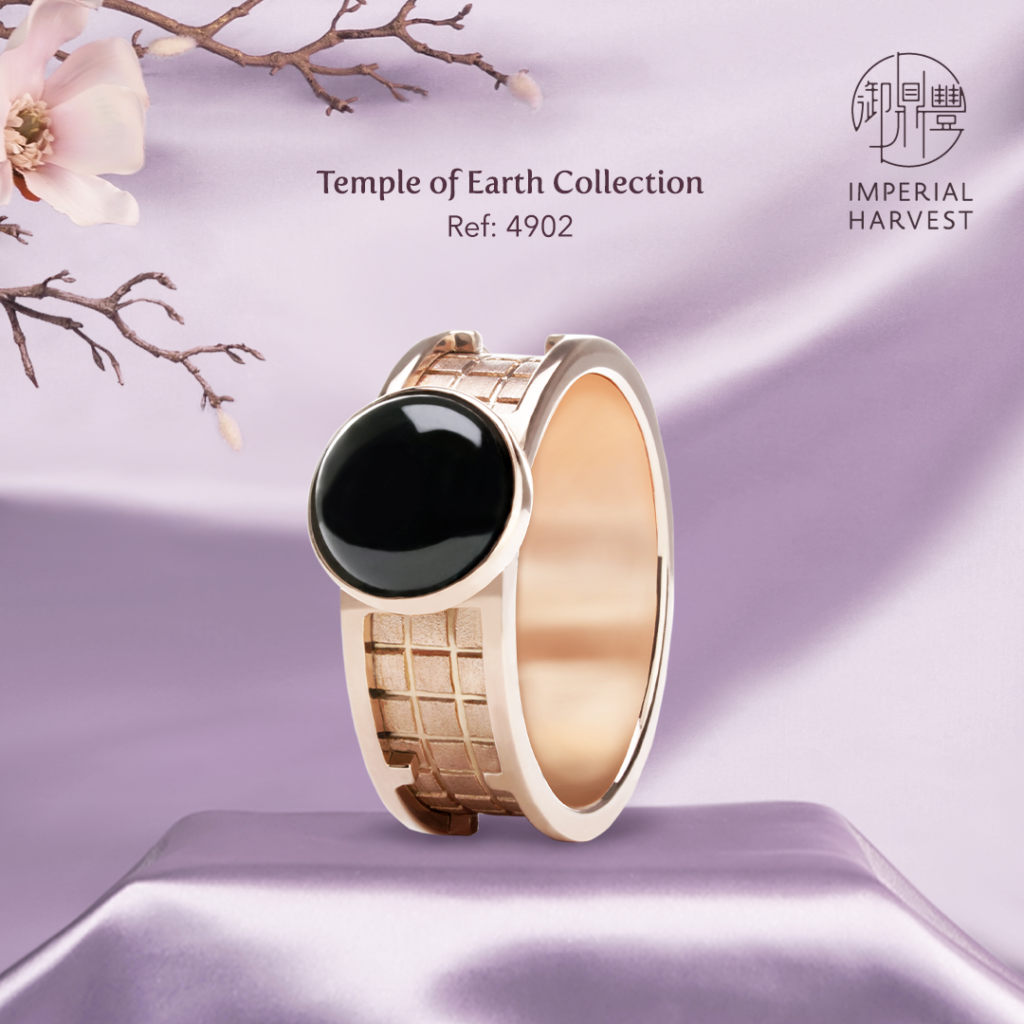
The distinctive Square-tiled surface of the other Bliss of Harvest: Temple of Earth Edition ring is an exquisite testament to the Temple of Earth’s square-themed architecture layout. This draws inspiration from the deep-seated Chinese philosophy of “天圆地方”, or “Round Sky, Square Earth”, which associates squares and square-shaped objects with the earthly realm.
The eight pairs of angular protrusions positioned evenly along the ring band are reminiscent of the sturdy pillars that buttress the main halls of the Temple of Earth. On the Bliss of Harvest ring, they subtly direct the gaze towards the pièce de résistance of the Imperial Feng Shui treasure – the immaculate fine jadeite cabochon firmly ensconced within its housing brackets on the band’s surface.
At Imperial Harvest, the innovative reimagination of ancient imperial ritualistic worship at the Temple of Earth pays tribute to the indelible heritage of this revered site. Reflecting the enlightened findings of ancient Imperial Feng Shui masters, the fine jadeite cabochon on the Bliss of Harvest ring confers upon blessed wearers elevated levels of intuitive interpretation and decision-making proficiencies. This facilitates strategic planning and execution of key personal and professional decisions, empowering them in the fulfilment of their inherent unlimited human potential.
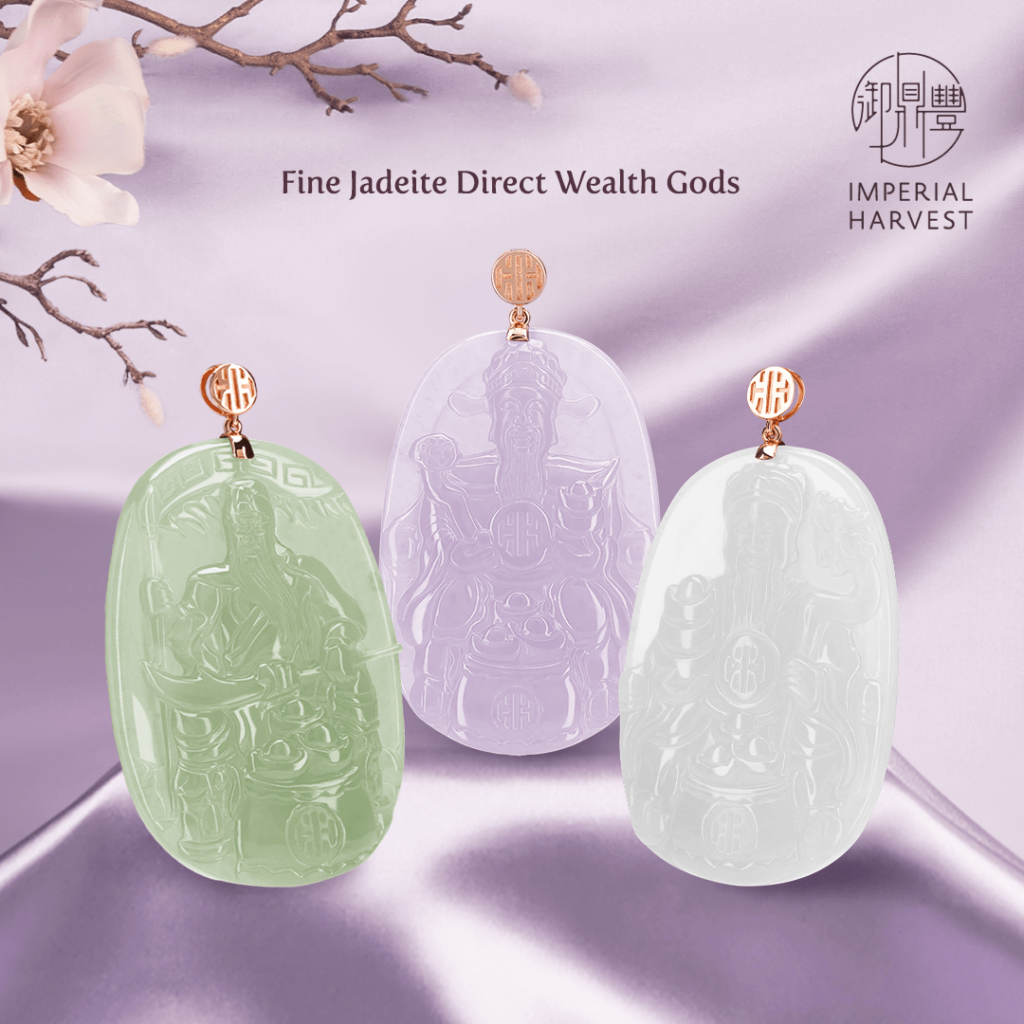
Given its proximity to the beginning of a new year in the Chinese calendar, it is inevitable that Li Chun is inextricably associated with Chinese New Year festivities. A new year, as reflected in the Chinese lunisolar calendar, is deeply associated with renewed luck and prosperity. This explains the intimate links between the Chinese New Year and the Grand Wealth God Bi Gan (大财神比干). Before his deification, Bi Gan was a prominent premier who adeptly guided King Zhou in the administration of the Shang Dynasty, leading to its flourishing success. Bi Gan’s eminent stewardship was recognised in his eventual deification as the Grand Wealth God.
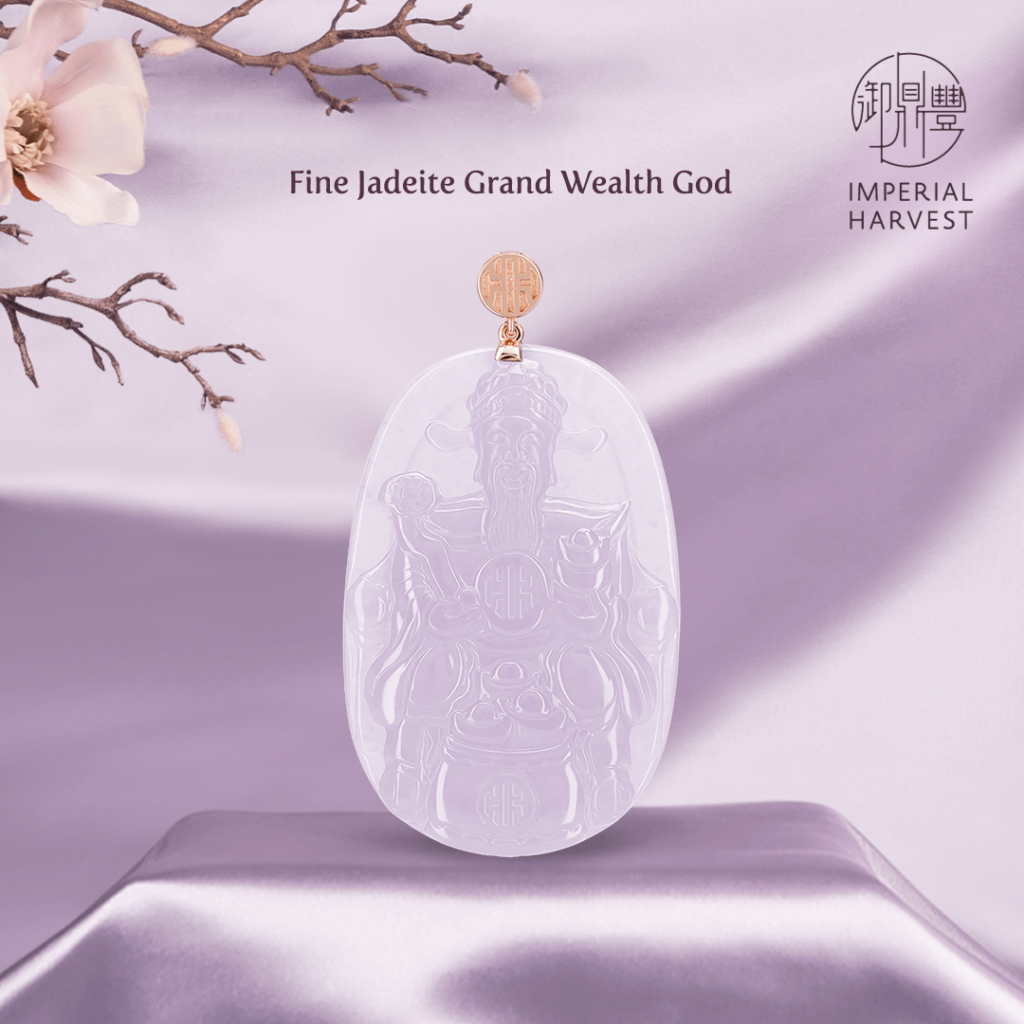
As the primary custodian of direct wealth, Grand Wealth God Bi Gan oversees devotees’ prosperity aspirations, empowering them with golden opportunities to grow their wealth and achieve the outcomes of their dreams. Bi Gan’s role is especially prominent on the first day of the first month in the Chinese calendar when he is actively sought to bestow his blessings of prosperity upon the year ahead.
This upcoming Li Chun season, Imperial Harvest ushers in a prosperous Chinese New Year with the Fine Jadeite Grand Wealth God, which immortalises Bi Gan’s authority, power and influence with a trio of wealth-garnering emblems – the Wushamao (乌纱帽), Ruyi Scepter (玉如意) and wealth-garnering Gold Ingots (聚财金元宝). Collectively, they bestow upon destined owners an abundance of opportunities and prosperity, facilitating their achievement of record-breaking sales, salary increments, windfalls and investment returns.
Direct Wealth Gods – Tua Pek Gong
Another important direct wealth God with increased prominence during the Li Chun and Chinese New Year period is Tua Pek Gong (福德正神大伯公), who is recognised as the God of Earth. While the emperor and his officials had access to the Temple of Earth to pay their respects to Tua Pek Gong, the common man often worshipped him at dedicated temples across the empire.
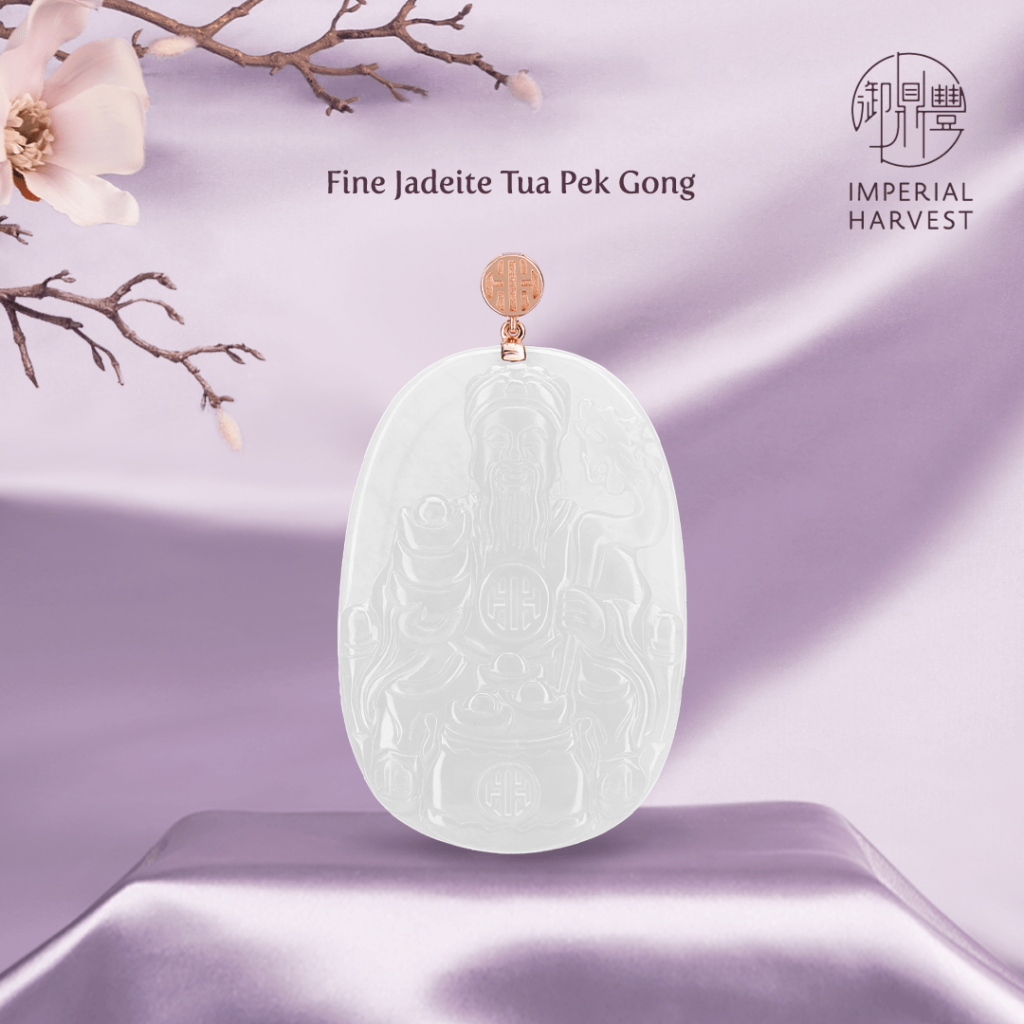
In his mortal days, Tua Pek Gong was a top government official who oversaw taxation matters. Serving in the imperial court during the Zhou dynasty, he performed a role, not unlike that of a modern-day finance minister. With his financial acumen, he took on a series of economy-based duties upon deification and came to be worshipped as a Career Wealth God.
In the Imperial Harvest Fine Jadeite Tua Pek Gong, he is depicted wielding powerful emblems of prosperity and power. For those seeking a prosperous beginning to the Year of the Tiger this Li Chun, Tua Pek Gong is depicted with a bounty of Gold Ingots (聚财金元宝), symbolising the good fortune and prosperity bestowed upon devotees. With the dragon scepter, the destined owner finds themselves brushing off the challenges posed by competitors, and soaring to unprecedented heights in their respective fields.
Direct Wealth Gods – Guan Gong
As Business Wealth God, Guan Gong (武财神关公) is especially significant to entrepreneurs this Li Chun. Known for his bravery and loyalty as a general serving under warlord Liu Bei (刘备), Guan Gong’s undying commitment to restoring the glory of the Eastern Han Dynasty was held in high esteem.
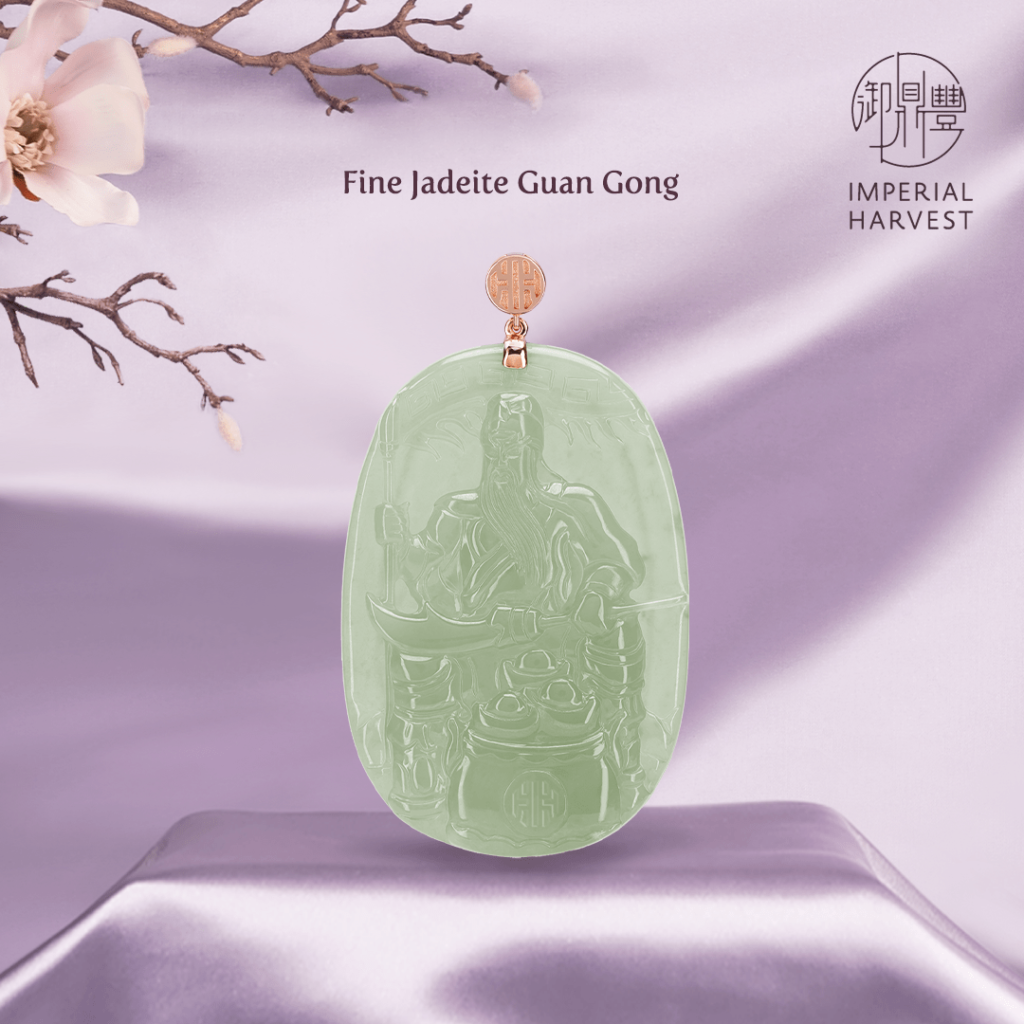
Even today, Guan Gong’s legendary tenacity and foresight on the battlefield are widely regarded as desirable qualities to emulate. In particular, they are highly applicable to budding entrepreneurs striving to grow and develop their ventures.
Indeed, business is war (商场如战场). Thriving in entrepreneurship is akin to emerging victorious in warfare. Acute foresight, business intuition and a well-connected network are essential ingredients for contemporary businesses to survive and thrive. As a well-rounded embodiment of these coveted traits, Business Wealth God Guan Gong inspires and empowers countless entrepreneurs in the pursuit of their dreams.
The Imperial Harvest Fine Jadeite Guan Gong depicts the acclaimed general wielding his Green Dragon Sabre, conferring upon his adherents unparalleled foresight, empowering them to eliminate malefactors. The victory flag, proudly wielded by the Business God of Wealth, equips devotees with the skills and determination necessary to triumph over their adversities. The wealth-garnering pot is a testament to his eminent status as a wealth god, inviting abundance and prosperity for our blessed clients.
As Li Chun brings with it the arrival of spring across the northern hemisphere, it presents a highly favourable opportunity to begin the new zodiac year with an optimal balance of the minor yang. Presenting impeccable jadeite cabochon treasures of the finest design and craftsmanship, Imperial Harvest stands ready to empower blessed clients with yet another year of elevated intuitive acumen. Paired with the auspiciousness of Imperial Harvest’s Fine Jadeite direct wealth Gods, the upcoming Li Chun season is poised to usher in yet another year of prosperity, growth and development for the Imperial Harvest family of blessed clients.
Imperial Harvest’s expert consultants are always on hand to guide you on your journey and provide you with insights to help you realise your fullest potential. Book a complimentary consultation today or contact us at +65 92301640.
We are located at
For prospective clients:Imperial Harvest402 Orchard Road
Delfi Orchard #02-07/08
Singapore 238876 For existing clients:Imperial Harvest Prestige
402 Orchard Road
Delfi Orchard #03-24/25
Singapore 238876
Most Read Articles
Get to read our life changing articles and get inspired.
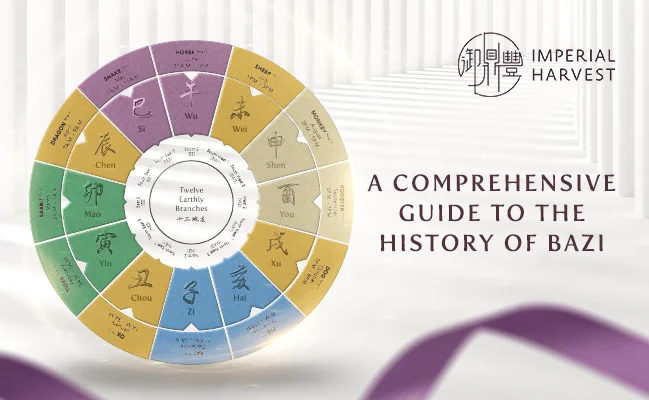
A Comprehensive Guide to the History of Bazi (八字)
Estimated Reading Time: 5 mins Bazi (八字) is often mistakenly assumed as the Chinese counterpart of western Astrology. The similarities between both systems lie in their utilisation of birth dates and time in their calculations, and the ability to be read from a tabulated chart. Where Astrology may take into account the positions of different […]

Imperial Harvest Consecration Ceremony
Estimated Reading Time: 5 mins At Imperial Harvest, each earthly treasure undergoes a series of consecration rites performed by Master David, before it is bestowed upon its blessed owner. Every aspect of these sacred Chinese anointing rituals is carefully examined and accurately represented in Master David’s blessings, reflecting Imperial Harvest’s deep respect for these esteemed […]
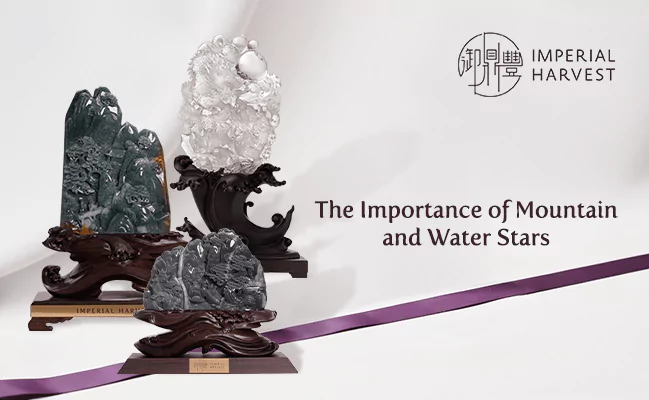
The Importance of Mountain and Water Stars
Estimated Reading Time: 4 mins “山管人丁,水管财”, is a well-cited principle in the study of Imperial Feng Shui that translates to “Mountains govern benefactors, authority and harmony, while Water governs wealth, opportunities and intuition”. This principle reiterates a critical factor in Imperial Feng Shui — balance is the key to achieving success in life. As mountain […]
